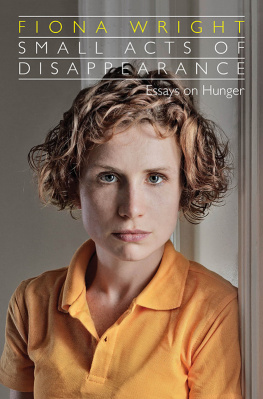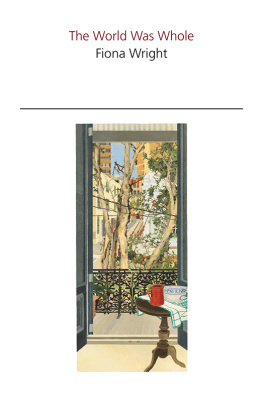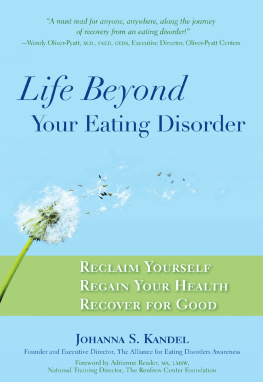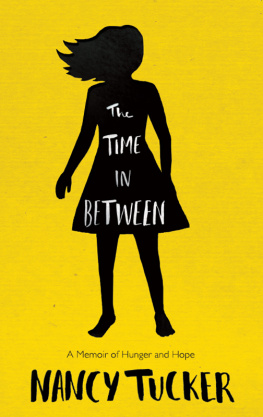Small Acts of Disappearance
Small Acts of Disappearance
Fiona Wright
Essays on Hunger

First published in 2015
from the Writing & Society Research Centre
at the University of Western Sydney
by the Giramondo Publishing Company
PO Box 752
Artarmon NSW 1570 Australia
www.giramondopublishing.com
Fiona Wright, 2015
Designed by Harry Williamson
Typeset by Andrew Davies
in 11.25/14 pt Garamond 3
Printed and bound by Ligare Book Printers
Distributed in Australia by NewSouth Books
National Library of Australia
Cataloguing-in-Publication data:
Wright, Fiona
Small acts of disappearance: essays in hunger
ISBN 978-1-922146-93-9 (pbk)
362.25092
All rights reserved.
No part of this publication may be reproduced, stored in a retrieval system or transmitted in any form or by any means electronic, mechanical, photocopying or otherwise without the prior permission of the publisher.
9 8 7 6 5 4 3 2 1
For my sisters: by blood, in-law and in arms
I speak of those years when I lived walled alive in myself, left with nothing but the inward search for joy, for a word that would ruffle the plumage of mind to reach its tenderest down; when consuming myself I endured, but could not change.
GWEN HARWOOD Past and Present
IN COLOMBO
I ll always remember the particular intensity that malnutrition brings on, I know that I miss it still. That alertness of sensation, where every minute cell in the body is awake and alive to the smallest details of the outside world. Ive been told this is instinctual, a biological reaction to the threat that the hungry body perceives itself to be under; that a malnourished animal is weaker, more vulnerable to predators, and compensates by trying to pick up on danger early enough to still be able to escape. The world glistens in this state of apprehension. Your skin prickles. When I was travelling in this state, so many days felt strangely brittle, saturated, super-real.
Even now, I find it hard to separate what I experienced in Sri Lanka from what I experienced in my body, to figure out how much of my perception was sharpened by my hunger, how much by the complicated novelty and otherness that travel always involves. At that stage, it was three years since I had fallen ill, but only eighteen months since the very rare and still-untreatable cause of my persistent vomiting had been identified. But Im not sure if the ground hadnt already shifted again then, if the physical disease hadnt taken on the disordered dimensions that Im fighting to this day.
Ive also discovered, since my diagnosis, that even specialist opinion has shifted as to the nature of that physical condition. Rumination is a muscular tic of the upper stomach and its sphincter. Like any muscular tic it is unconscious and uncontrollable, but at least in part psychosomatic. This doesnt make it any less bodily, any less real. When I was finally diagnosed, the first thing the specialist said was Youre not making this up and youre not going mad; and eight years later the condition was added to the Diagnostic and Statistical Manual of Mental Disorders, the DSM, which is the standard classification manual for mental health used by psychiatrists worldwide.
I travelled to Sri Lanka three years before I stepped for the first time inside the office of a psychologist, five years before I fully realised that there was more to my illness, to my hunger, than simple physicality. But I sometimes think that it was here, in Colombo, that things changed, and my illness grew more complicated. Even so, I never can tell to what degree pathology stood between me and the country that I came to love, or if I ever could have done things differently.
On my first day in Colombo, I wrote in my journal that the light seemed golden, that Id felt pure joy on seeing so many animals monkeys and lizards, crows and cows wandering the red-earthed streets. On my second day, unable to properly pronounce the name of the suburb in which I was living, I got completely lost, riding in the backseat of a three-wheeler taxi, until the driver tried to kiss me in an unmapped alley. I ended up walking in the late-season rain, along streets that had no footpaths, to the low-roofed house where I was billeted to a Sinhalese family, then standing, silent and shaking, at my bedroom window, which overlooked a primary school, the children in immaculate white uniforms running on the pressed dirt of its playground. I already felt too small for the situation Id placed myself in, alone and as-yet untravelled, in a part of the world I knew almost nothing about.
On my third day in Colombo, I started work. I arrived early at the offices of the local English-language newspaper where I was interned, and my section editor immediately assigned me to a story on the street children of the city. Im still not sure if she was deliberately trying to provoke me, fresh off the plane as I was, to throw my complacent, sunburnt skin into a world that I had little comprehension of. Anesha, a young and quiet colleague with a thick wave of hair reaching right to her waist, accompanied me to translate. We took a driver, and a van, my digital camera. Id had half a piece of strangely sweet toast with imported Marmite for breakfast. My billet family had bought the Marmite for me from a small grocer near their house; it was stocked alongside Diet Coke, pasta, and toilet paper on a shelf labelled Western Items near the back of the store.
I never found out the names of the places we went to that day, I never went through them again in my whole time in the city. We drove to a rubbish tip beside a timber train station, untouched since the so-called British era, the thick awnings corroded with insect bole, a round rust-coloured clock unmoving above the entrance, looking for signs of hungry children. Shredded pieces of black plastic flapped at our approach, and fat crows stared us down, but otherwise there was stillness, just hot silence. At high noon, we reached a string of kovils, the intricately sculpted, intensely-coloured Hindu temples worshipped in by what remains of Colombos Tamil population.
These too were built beside a garbage ground, dotted with small timber stalls where women sold strings of marigolds and enormous platters of tropical fruit, to leave as offerings inside the shadowed temples. Anesha pointed out the separate kovil for the women, the ripe-looking goddesses dancing along the length of each steeple, the pawpaws cut open and rotting by the door, in petition for fertility. She bought one for me. I was twenty-three, and had no babies. I also hadnt bled for three whole years. Inside, I watched a series of young women bash coconuts against their heads, then bow before a painted goddess in an alcove.
Outside, Anesha was waiting, squatting on her heels beside a woman with a small child in her lap. The child wore a faded polo-shirt, no pants, and put his fingers to his mouth as I approached. What did I want to ask? Anesha said. The sun was beating on my back, a small, black fly crawling on my forearm, the red leather of my shoes constricting in the heat. The child kept gesturing his fingers to his mouth. His mother said that he was five years old, and wouldnt allow him to be photographed in case his school teachers and classmates found out that he was homeless.
At the other end of town, Anesha and the driver stopped for juice and cutlets, little fried fish croquettes wrapped in old school worksheets which soaked up the oil into transparent patches. I bought a bottle of water, alert and strong.
We spoke to a girl that day who lived beneath tarpaulins on the outskirts of De Soysa Circus, a sweeping boulevard near the centre of the city, which once went by the name of Lipton Circus. She was pretending to play cricket with her brothers as we approached, miming the actions of bowling and batting at a non-existent ball. She was beautiful. The skin on her shins was thick and grey and shiny. She told me that she liked to watch the women going to Odel, Colombos large department store, just across the road, and to pretend that she was going shopping too.
Next page









